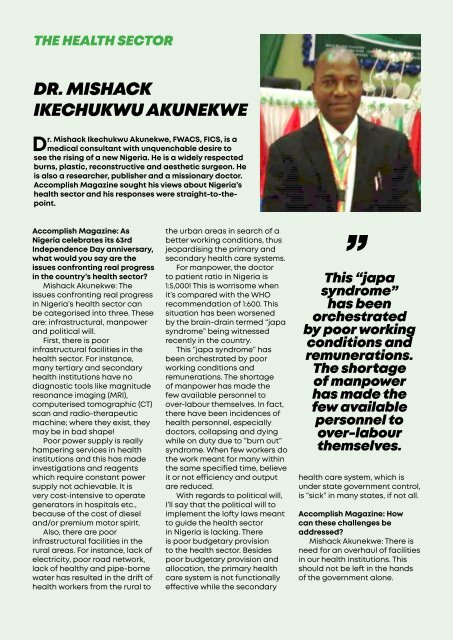ACCOMPLISH MAGAZINE OCT 2023
Aliko Dangote: The Strategist Behind West Africa’s Largest Industrial Conglomerate
Aliko Dangote: The Strategist Behind West Africa’s Largest Industrial Conglomerate
Create successful ePaper yourself
Turn your PDF publications into a flip-book with our unique Google optimized e-Paper software.
The Health Sector<br />
Dr. Mishack<br />
Ikechukwu Akunekwe<br />
Dr. Mishack Ikechukwu Akunekwe, FWACS, FICS, is a<br />
medical consultant with unquenchable desire to<br />
see the rising of a new Nigeria. He is a widely respected<br />
burns, plastic, reconstructive and aesthetic surgeon. He<br />
is also a researcher, publisher and a missionary doctor.<br />
Accomplish Magazine sought his views about Nigeria’s<br />
health sector and his responses were straight-to-thepoint.<br />
Accomplish Magazine: As<br />
Nigeria celebrates its 63rd<br />
Independence Day anniversary,<br />
what would you say are the<br />
issues confronting real progress<br />
in the country’s health sector?<br />
Mishack Akunekwe: The<br />
issues confronting real progress<br />
in Nigeria’s health sector can<br />
be categorised into three. These<br />
are: infrastructural, manpower<br />
and political will.<br />
First, there is poor<br />
infrastructural facilities in the<br />
health sector. For instance,<br />
many tertiary and secondary<br />
health institutions have no<br />
diagnostic tools like magnitude<br />
resonance imaging (MRI),<br />
computerised tomographic (CT)<br />
scan and radio-therapeutic<br />
machine; where they exist, they<br />
may be in bad shape!<br />
Poor power supply is really<br />
hampering services in health<br />
institutions and this has made<br />
investigations and reagents<br />
which require constant power<br />
supply not achievable. It is<br />
very cost-intensive to operate<br />
generators in hospitals etc.,<br />
because of the cost of diesel<br />
and/or premium motor spirit.<br />
Also, there are poor<br />
infrastructural facilities in the<br />
rural areas. For instance, lack of<br />
electricity, poor road network,<br />
lack of healthy and pipe-borne<br />
water has resulted in the drift of<br />
health workers from the rural to<br />
the urban areas in search of a<br />
better working conditions, thus<br />
jeopardising the primary and<br />
secondary health care systems.<br />
For manpower, the doctor<br />
to patient ratio in Nigeria is<br />
1:5,000! This is worrisome when<br />
it’s compared with the WHO<br />
recommendation of 1:600. This<br />
situation has been worsened<br />
by the brain-drain termed “japa<br />
syndrome” being witnessed<br />
recently in the country.<br />
This “japa syndrome” has<br />
been orchestrated by poor<br />
working conditions and<br />
remunerations. The shortage<br />
of manpower has made the<br />
few available personnel to<br />
over-labour themselves. In fact,<br />
there have been incidences of<br />
health personnel, especially<br />
doctors, collapsing and dying<br />
while on duty due to “burn out”<br />
syndrome. When few workers do<br />
the work meant for many within<br />
the same specified time, believe<br />
it or not efficiency and output<br />
are reduced.<br />
With regards to political will,<br />
I’ll say that the political will to<br />
implement the lofty laws meant<br />
to guide the health sector<br />
in Nigeria is lacking. There<br />
is poor budgetary provision<br />
to the health sector. Besides<br />
poor budgetary provision and<br />
allocation, the primary health<br />
care system is not functionally<br />
effective while the secondary<br />
“<br />
This “japa<br />
syndrome”<br />
has been<br />
orchestrated<br />
by poor working<br />
conditions and<br />
remunerations.<br />
The shortage<br />
of manpower<br />
has made the<br />
few available<br />
personnel to<br />
over-labour<br />
themselves.<br />
health care system, which is<br />
under state government control,<br />
is “sick” in many states, if not all.<br />
Accomplish Magazine: How<br />
can these challenges be<br />
addressed?<br />
Mishack Akunekwe: There is<br />
need for an overhaul of facilities<br />
in our health institutions. This<br />
should not be left in the hands<br />
of the government alone.<br />
6<br />
Accomplish Magazine

















